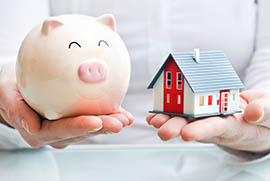 Auckland's average house price has officially cracked the $1 million mark, with politicians demanding a government response to the "scandalous" milestone.
Auckland's average house price has officially cracked the $1 million mark, with politicians demanding a government response to the "scandalous" milestone.However, Prime Minister John Key says the unwelcome figure is simply the sign of a market moving up and down - although he has conceded it would be fine if prices "eased back a wee bit".
Across Auckland, the average value is now $1.01m, up 16 per cent from 2015, QV said on Tuesday. Across New Zealand, residential property values increased 14.6 per cent in the same period.
Economist Shamubeel Eaqub said the milestone was not surprising. "The interesting thing now is whether or not it becomes a psychological barrier. The Auckland housing market is extraordinarily unaffordable."
Eaqub's calculations showed that Aucklanders saving 10 per cent of their income for a deposit and then paying off a mortgage at a third of their income could expect it to take them a total of 70 years.
Key said the $1 million mark was due to a strong economy and low interest rates, but it was possible average prices could drop back below that figure.
"The simple message is that things move around and all markets that go up can sometimes go down as well."
Asked whether he wanted average prices to drop below $1 million, Key said: "Yeah, well you know it wouldn't worry me if they eased back a wee bit but I don't think house prices should halve."
There was "a huge pipeline of activity" to boost the city's housing and ease pressure on the market, he said.
Earlier in the day, Key suggested he would back the Reserve Bank if it imposed restrictions on debt-to-income ratios, limiting how much money people could borrow for their mortgage.
Labour leader Andrew Little said crossing the $1 million barrier was "scandalous", and showed the Kiwi dream of home ownership was unravelling.
The Prime Minister has attempted to cool fears over the average Auckland house price breaching the $1 million mark.
The Prime Minister has attempted to cool fears over the average Auckland house price breaching the $1 million mark.
"National has three ministers responsible for housing.
"Nothing they have done has slowed the skyrocketing house price rises that are locking a generation out of home ownership, or the flow on effect of rapid rent increases which are forcing some families out on the street."
Maori Party co-leader Marama Fox said the rising prices were out of reach for most Kiwis.
"A million dollars; who's buying a million-dollar home? I'm certainly not."
The Government needed a comprehensive plan for housing, rather than its "piecemeal" approach so far, Fox said.
'NOT SUSTAINABLE'
ACT leader David Seymour said the Government had not done enough to improve land planning and fund infrastructure for new developments.
Voters in his wealthy Epsom electorate were also worried about the rising prices, despite the boost to their own property values, due to concerns about their children's future.
"That's right [that their property values have increased] but they also understand their children need somewhere to live and they're increasingly concerned about that.
"15 per cent increases year on year are simply not sustainable and people know while the Government has introduced a lot of well-meaning policies, none of them have been effective at changing prices."
ACTIVITY SLOWING
QV spokeswoman Andrea Rush said there were signs the new loan-to-value rules, requiring investors to have 40 per cent deposit on their purchases, were having an effect on the market.
"In recent weeks there has been a drop-off in market valuation requests, auction clearance rates, open home attendees and loan application rates in these centres [Auckland, Tauranga and Hamilton]."
QV general manager for the region Jan O'Donoghue agreed there had been a noticeable easing in market activity in Auckland, probably because of the new rules.
Hamilton, which has been benefiting from the "halo effect" of Aucklanders looking further afield, has also experienced a shift in pace, with a reduction in the number of buyers attending open homes and auctions
In Tauranga, valuer David Hume said he did not expect to see as much price growth over the coming year as had been experienced over the past 12 months.
ASB chief economist Nick Tuffley said banks had had to introduce the rules quickly - acting within the spirit of them even before they were formally confirmed.
He said mortgage applications had tapered off and prices could be expected to follow. But he said that would probably not last and there could be a "bounce" early next year.
Other parts of the country are still going strong.
Wellington is still experiencing strong growth, while Whangarei, Rotorua and Queenstown have all recorded annual growth of more than 20 per cent.
Palmerston North's values are up 10 per cent after a long period of little movement, although Christchurch is largely flat.
.png)




.png?width=200&height=100&name=RE%20Investar-Logo-MRI_Colour%20web%20229x115px%20(1).png)